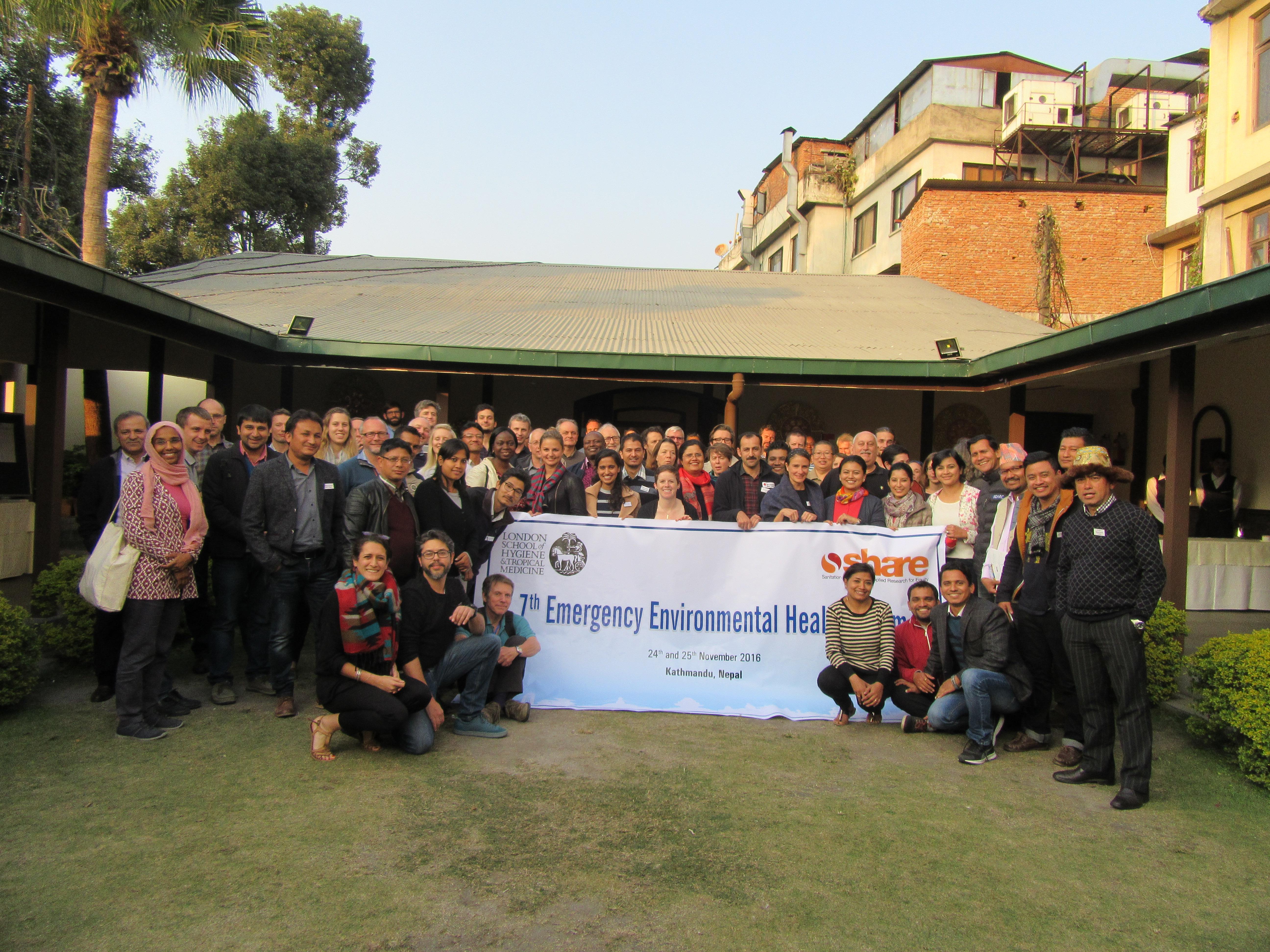'Thinking Practitioners and Practical Thinkers': Reflections from EEHF 2016

In November 2016, SHARE supported the 7th Emergency Environmental Health Forum taking place in Kathmandu, Nepal. Alex Czerniewska, MSc Graduate from LSHTM, attended the conference and shares her thoughts with us…
First impressions
In November, I travelled to Kathmandu to present research findings at the Emergency Environmental Health Forum (EEHF). An informal group of organisations (ACF, Care, ICRC, IFRC, IRC, Oxfam, MSF, UNHCR, and UNICEF) organizes this annually to piggyback on to the end of the UN WASH Cluster meeting, with support from the SHARE Consortium. It’s an opportunity for NGOs, UN organisations and research institutions to share field-level experiences, discuss new approaches and results, and identify areas within the emergency WASH sector where more attention or evidence is needed.
I was expecting the event to be a bit of an ‘echo chamber’ (to steal 2016’s favourite buzzword) but it wasn’t at all! There was a huge diversity of roles, backgrounds and disciplines in the room –a mix of ‘thinking practitioners and practical thinkers’, as one person put it. Presentations ranged from painstaking experiments like testing the efficacy of chlorine to kill the Ebola virus, to technical lessons on how to rehabilitate a borehole, to considerations of socio-cultural perceptions of disease in programme planning.
Refreshingly, there was no ‘standard’ presentation template - each NGO presenter had carved out a unique space and purpose for ‘research’ within their programmes, and each academic had met the challenge of presenting practical, relevant findings in a different way. I didn’t envy the people who were expected to sum it all up at the end of the day!
Using evidence to influence policy makers and practitioners
One theme of the conference was the need to generate good evidence to influence policymakers and practitioners. My own presentation looked at hygiene promotion programmes during the Ebola outbreak in Liberia - research I’d done for my MSc thesis at LSHTM. I found a mismatch between evidence and practice in the programmes delivered. Most focussed only on providing hygiene materials and educational messaging, without using tools and approaches that we know can be successful for changing behaviours – e.g. tailoring messages, tapping into emotional motivators, or through the use of ‘nudges’ or ‘triggers’.
Other presenters explored a similar question: How do we design programmes to fit the population affected, rather than aiming to get the population to fit the programme? Michelle Farrington from Oxfam had looked at Oxfam’s WASH programmes during health emergencies going back ten years. She concluded that taking the time to understand socio-cultural perspectives (e.g. social norms, cultural practices, social status, perception of risk etc.) could lead to better programme design – saving time, money and lives. She suggested that deploying more social scientists/anthropologists at the start of an emergency might help, but only if other WASH actors were willing to adapt programmes according to their recommendations.
Perhaps one reason that these messages don’t always translate into practice is a lack of hard evidence on what really drives behaviour in emergencies, and what different interventions can do to shape this. With that in mind, my presentation suggested a few areas that might be interesting for future research in this area, e.g. how fear drives behaviour change over the course of a prolonged outbreak; finding appropriate ways to incorporate social pressure and social norms into emergency programmes, and coming up with new and quicker ways to carry out ‘formative research’ when the aim may not (necessarily) be to create long term demand for a product or outcome.
Sharing more information… and publishing findings
Sharing information was another conference theme - whether by sharing plans for new trials or generally by improving communication between NGOs, researchers, donors and other WASH actors. Specifically, the conference leaders challenged each presenter to publish their work. I am sure I wasn’t the only person to find this a slightly scary prospect: What if my work isn’t important enough? What if it gets rejected? What if people disagree with my findings? On the other hand, there is so little published on WASH in emergencies, that any new findings could make an important contribution.
Travis Yates from Tufts University presented the results of a systematic review into WASH intervention effectiveness in emergencies and outbreaks. He’d planned to use grey literature (reports from NGOs/unpublished research findings) as well as published papers to get around this problem. However, his frustration was obvious – he’d struggled to access information from sector organisations, and grey literature databases were poorly populated or difficult to search. Those that he did find used a huge range of different outcome measures, so presenting summary risk reductions statistics for any given intervention was impossible.
In light of this, I’m making it my 2017 resolution to publish my work. Even if the findings are not surprising, it could help to create a consensus around what questions we should be asking, and what new pieces of evidence we’ll need to better help populations in crisis.
To find out more about EEHF, see our Storify of key highlights for the 2016 conference, or view the presentation slides.
